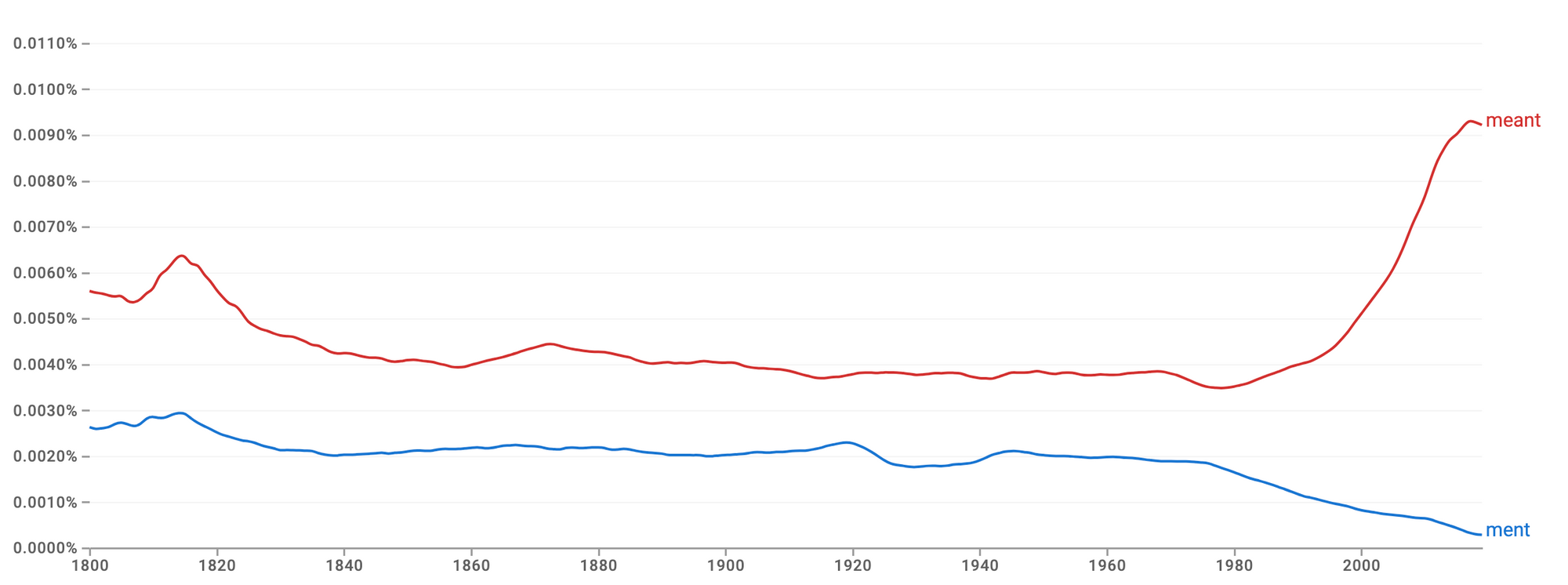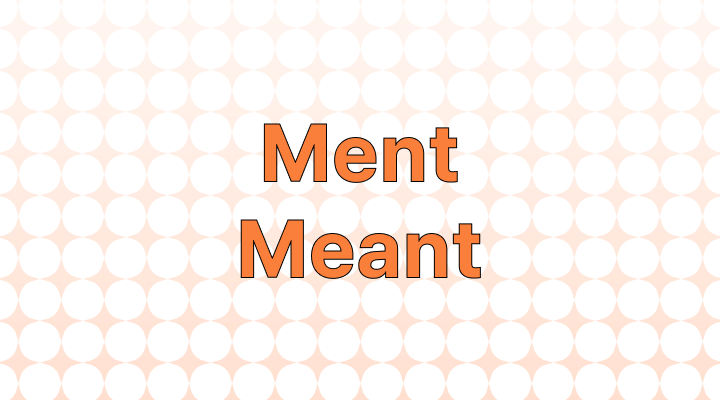- "Ment" is an incorrect spelling of the word "meant."
- "Meant" is the past participle of the verb "mean," and it is used to indicate intention or purpose in the past.

❌ I ment to call you yesterday, but I got caught up in a meeting.
✅ I meant to call you yesterday, but I got caught up in a meeting.
In this sentence, "meant" signifies the speaker's intention or purpose to call, emphasizing that it was planned or intended.
What does "meant" mean?
"Meant" expresses intent or meaning. Here are some ways to think about "meant":
1. Intended or Intended for: This is the most straightforward meaning. When you say something is "meant" for someone or something, you're stating its intended purpose or recipient.
- "This gift is meant for your birthday."
- "The warning sign was meant to deter trespassers."
2. Past Tense of "Mean": "Meant" also serves as the past tense and past participle of "mean," signifying something that had a particular significance or intention in the past.
- "She meant no harm by her words."
- "The faded inscription meant something different centuries ago."
3. Implied or Suggested: Sometimes, "meant" implies something without explicitly stating it. It suggests an undercurrent of intended meaning or hidden significance.
- "His raised eyebrow meant disapproval."
- "The silence in the room meant the negotiations had fallen through."
4. Expressing Fate or Destiny: In a more philosophical sense, "meant" can suggest a preordained path or destiny. It implies that something was bound to happen in a certain way.
- "He was meant to become a musician."
- "Their paths were meant to cross."


The use of "ment" and "meant" over time
The Ngram graph below shows how often "ment" and "meant" have been used from the 1800s to the 2000s. "Meant" has seen steady use until sharply increasing in the 2000s, while its misspelling "ment" has declined in use in the 21st century.

How to pronounce "meant"
In both British and American English, "meant" is pronounced like "ment".
This is just the standard pronunciation, and there may be slight variations depending on regional accents and individual speech patterns.
Why would we misspell "meant" as "ment"?
- Phonetic error: "Meant" is pronounced with a clear 'ea' sound, but someone might mistakenly think it follows the pattern of rhyming words like "sent" or "spent," leading to the misspelling "ment."
- Inflection confusion: Some individuals might associate the past tense form of verbs with the "-ent" ending, as seen in words like "sent" or "spent," leading them to incorrectly spell "meant" as "ment."
Other common misspellings of "meant"
- Mentt
- Meent
- Meannt
- Mient
- Maent
Example sentences of the misspelling of "meant" as "ment"
- "Ment" is an incorrect spelling; the intended word is "meant."
- Don't use "ment" here; the correct term is "meant."
- There's a mistake in your spelling; it should be "meant," not "ment."
- "Ment" is not a valid form; you meant to write "meant."
- Double-check your spelling; it's "meant," not "ment."
Example sentences of "meant"
- She meant to express her gratitude but forgot to mention it.
- His actions were meant to illustrate the importance of teamwork.
- The note on the fridge was meant as a reminder for everyone.
- The apology was heartfelt and meant to mend their strained relationship.
- The carefully chosen words were meant to inspire and motivate.
- The surprise gift was meant to convey appreciation for her hard work.
- His silence was not meant to be rude but rather a sign of deep contemplation.
- The elaborate gesture was meant to symbolize their everlasting commitment.
- The detailed instructions were meant to guide users through the installation process seamlessly.
- The heartfelt apology was genuinely meant to mend the rift that had developed between them.
🖊️ Complementary vs. Complimentary
🖊️ Purposely vs. Purposefully
Synonyms for "meant"
- Intended
- Planned
- Signified
- Purposed
- Conveyed

Want to sound like a native speaker?
Engram’s AI-powered grammar checker makes your English sound like a native speaker’s, suggesting natural English expressions on top of fixing grammar, spelling, punctuation, word order, and vocabulary.

References:















